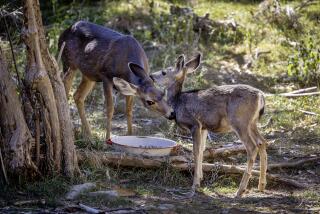Wildlife Paradise Tests Spain’s Ecological Will : Ecology: Residents and environmentalists clash on plans for development adjacent to wetlands.
- Share via
COTO DONANA, Spain — A flat expanse of marshland and dunes, home to rare birds and a few fishermen, has become a furious debate over Spain’s reputation as one of western Europe’s worst ecological offenders.
Some local residents have threatened to burn down the Donana reserve if plans for a 32,000-bed resort next door are shelved. Ecologists, on the other hand, suspended themselves from Seville’s 310-foot high cathedral tower in protest against the project.
Naturalists say the resort will drain precious water from the 195-square-mile Donana reserve in southern Spain, one of Europe’s great surviving wetlands. The area is home to rare species such as the Imperial Eagle and lynx and a vital resting ground for birds migrating between Africa and Europe.
“The project doesn’t even offer benefits to the surrounding communities,” said Carlos Martin of the Spanish Ornithological Society, criticizing a lack of ecological awareness in Spain.
Spain, unlike other large western European nations, has no environment ministry and only recently upgraded the function in the public works ministry to a secretariat-general.
From the litter thrown from cars (despite the creation of “Green Police”) to the toxic waste spewed out by factories often ignoring environmental norms, Spain has yet to succumb to the ecology movement sweeping many other parts of Europe.
“There is not much ecological awareness in our country . . . and we must change consumer habits and the way we behave,” said Domingo Ferrero, secretary-general for the Environment.
Spain has some of the rarest animals on the Continent--including bears and wolves--but hunters, developers and tourists are rapidly encroaching on their habitat.
The European Community Commission in Brussels turned its attention to Spain in March telling it to curb the illegal trafficking of chimpanzees and tigers.
It recently published figures showing Spain, a candidate to host the new EC Environmental Agency, had committed 57 infractions of EC environmental laws, making it easily the worst offender followed by Belgium, Greece and France. Spain disputes the findings, saying there were only 16 firm infractions.
The EC Commission has opened an investigation into Donana, based on the ornithological society’s claim that bird life there is in danger. But park directors say the fears are exaggerated.
“We now understand our ecosystem perfectly, and while we must monitor the situation constantly, there are no major problems,” said Eduardo Crespo, deputy director of the Coto Donana.
Representatives of the World Wide Fund for Nature have warned of the effect on Donana’s water table from the resort, but other conservationists disagree.
“It won’t affect Donana’s water table,” said Crespo, who nonetheless opposes the development on the ground that it will cement over still more of Spain’s already overbuilt coast.
Spanish ecologists say large-scale tourism has played a big role in desertification.
The Iberian peninsula was once so thickly forested it is said a squirrel could cross it without touching the ground, but enduring images now are of treeless plains in Castilla-La Mancha or the massive condominiums of the Costa del Sol.
An intense press campaign against the Donana project led to congressmen visiting in May and urging its relocation inland.
Spain believes it has been unfairly singled out for criticism, pointing out that advanced industrial countries such as West Germany and France polluted heavily in the past.
“The others seem to forget Spain is still catching up and environmental priorities must be balanced against the country’s overall well-being,” a Spanish official in Brussels said.
Recognizing that rapid industrial development will need a drastic improvement in pollution control, the government has earmarked $11 billion to meet EC norms by 1994.
But in a recent interview with Spanish newspaper El Pais, EC Environment Commissioner Carlo Ripa di Meana said Brussels will be watching Spain more carefully in future.
The Spanish government is still awaiting formal notification from Brussels of the investigation into Donana, following which it will have a year to present its response.
“We cannot shut our eyes to a catastrophe in a zone which is sacred to Europe. If a marsh is lost it cannot be replaced,” Ripa di Meana said.
More to Read
Sign up for Essential California
The most important California stories and recommendations in your inbox every morning.
You may occasionally receive promotional content from the Los Angeles Times.












